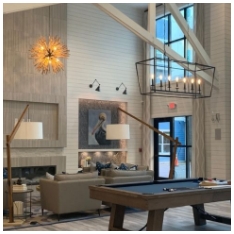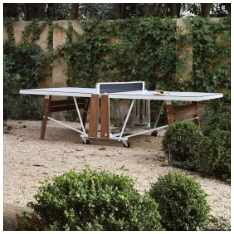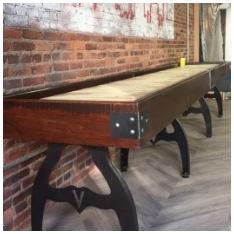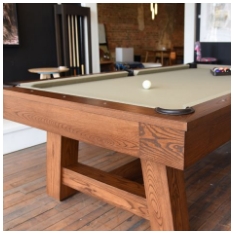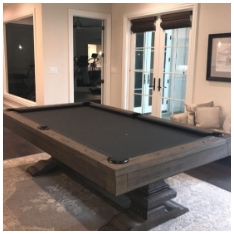Buying a pool table is an investment that can last decades if you choose well. Whether you’re adding one to your home, game room, or commercial space, the table’s quality determines how enjoyable and consistent your gameplay will be. Poorly built tables can warp, lose alignment, or cause uneven ball movement, leading to frustration and costly repairs.
This guide explains how to test for quality when looking for pool tables, covering materials, design, build standards, and inspection tips to help you make an informed choice.
Why Quality Matters in a Pool Table
A pool table is more than just a surface for playing—it’s a precision piece of equipment. The slightest imperfection in its structure can affect the way balls roll, bounce, and react.
High-quality tables are designed to:
- Maintain a level playing surface over years of use.
- Provide consistent ball response and accurate shots.
- Withstand wear from regular play without losing structural integrity.
- Retain aesthetic appeal through durable finishes and materials.
Investing in quality means you’re not just paying for the table but for the longevity and reliability of your playing experience.

The Key Factors to Check When Testing Pool Table Quality
When learning how to test for quality when looking for pool tables, focus on the areas that influence performance and durability.
1. Frame and Cabinet Construction
The frame supports the slate and ensures long-term stability. A well-constructed frame prevents sagging or warping.
What to Look For:
- Solid hardwood frames are preferred for their strength. Avoid particle board or MDF frames in high-use settings.
- Double center beams provide added support for larger tables.
- Joints should be tightly fitted and reinforced with metal brackets or bolts.
Test Tip: Press on different parts of the frame. If it flexes, creaks, or shifts, it may lack structural stability.
2. Slate Quality and Thickness
Slate is the stone surface beneath the cloth, and it directly impacts the game’s smoothness and accuracy.
What to Look For:
- Three-piece matched slate is the standard for professional-level tables because it allows precise leveling.
- Thickness should be at least ¾ inch, with 1 inch being ideal.
- The slate should be diamond-honed for a perfectly flat surface.
Test Tip: Run your hand over the slate under the felt to detect any irregularities. Ask to see the slate if possible before purchase.
3. Cushion Rubber Quality
Cushions (also called rails) affect how balls rebound. Low-quality cushions lose their elasticity quickly.
What to Look For:
- High-grade natural gum rubber cushions last longer and provide consistent bounce.
- Rails should be securely attached to the table frame without gaps.
Test Tip: Bounce a ball against each cushion and note whether it returns at a consistent angle and speed.
4. Cloth Material and Fit
The cloth, often referred to as felt, affects ball speed and accuracy.
What to Look For:
- Wool-nylon blends like worsted cloth are smooth, durable, and used in tournaments.
- Tight, wrinkle-free installation is essential for even ball movement.
- Color should be even with no signs of wear, pilling, or fraying.
Test Tip: Roll a ball slowly across the table and see if it veers—this could indicate uneven cloth or slate issues.
5. Pockets and Pocket Liners
Pockets endure constant ball impact, so their durability matters.
What to Look For:
- Leather drop pockets or durable rubberized materials resist cracking.
- Pocket openings should meet regulation sizes for the table type.
- Fastening should be secure, with no loose stitching or gaps.
Test Tip: Gently tug on the pocket liner—if it loosens easily, it may not hold up over time.
6. Leveling System
An uneven table ruins gameplay, so a quality leveling system is essential.
What to Look For:
- Adjustable leg levelers for home use.
- Slate shims for fine adjustments in professional installations.
Test Tip: Use a carpenter’s level in multiple spots on the table surface to confirm flatness.
In-Person Testing Steps for Pool Tables
Knowing the theory is one thing, but inspecting the table in person is the best way to judge its quality.
Step 1 – Inspect the Overall Build
Stand back and look at the table’s symmetry, finish, and craftsmanship. Misaligned edges or inconsistent finishes can signal poor construction.
Step 2 – Check Slate Alignment
If possible, see the slate before the cloth is installed. Check for smooth seams and no visible cracks or chips.
Step 3 – Test the Bounce
Shoot balls against different rails to confirm rebound consistency.
Step 4 – Roll Test
Roll a ball slowly across various directions. If it changes course without being hit, the table may be uneven.
Step 5 – Evaluate Stability
Push gently on one corner of the table. It should not rock or wobble.
Differences Between Home and Commercial Pool Tables
When learning how to test for quality when looking for pool tables, it’s important to consider where the table will be used.
- Home Tables: May use lighter materials but should still have solid frames and proper slate. Ideal for casual play.
- Commercial Tables: Built for heavy use with reinforced construction, thicker slate, and professional-grade cloth.
Common Mistakes Buyers Make
Avoid these pitfalls when choosing a pool table:
- Ignoring the slate thickness and settling for thin or synthetic surfaces.
- Overlooking cushion material quality.
- Not testing the table in person before purchase.
- Choosing based solely on appearance rather than build quality.
Conclusion
Understanding how to test for quality when looking for pool tables ensures you invest in a piece that delivers accurate play and lasting durability. By inspecting materials, construction, and play performance, you can make an informed decision and enjoy years of consistent, enjoyable games.

